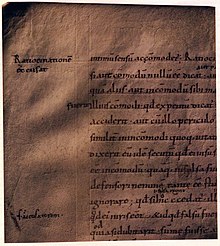Notker III.

Notker III. , called Notker Labeo, Notker Teutonicus or Notker the German (* around 950 in Thurgau ; † June 28, 1022 in St. Gallen ), was a Benedictine monk and head of the monastery school in St. Gallen. He was the first Aristotle commentator of the Middle Ages and the most important translator before Luther.

Life
Notker translated individual works from ancient Latin literature , which were part of the convent school in the early Middle Ages , into Old High German . His translation and commentary on the Psalter is particularly important .
The authors he has translated also include Boethius , Martianus Capella and the book of Job from the Old Testament. From Boethius he translated, among other things, Aristotle transmissions and commentaries.
Notker died of the consequences of an infectious disease, which participants in the Italian campaign of Emperor Heinrich II had brought to St. Gallen.
plant
Notker's translation technique is not one-sidedly geared towards understanding the Latin text, but rather aims at an appropriate (old high) German expression. This made him especially popular with his students. Notker has de facto created a new scientific language and a German literary language interspersed with artistic sensitivity.
The graphematic system that he helped create for his Alemannic mother tongue is also impressive . Notker commented on this in a letter to Bishop Hugo von Sitten as follows: "One must know that the German words cannot be written without an accent - acute and circumflex - with the exception of articles that are pronounced alone without an accent."
Notker's initial law
Notker was a keen observer of his Alemannic language, which was also reflected in his works in the spelling of the plosives : In his writing system, b and p, d (as far as <germ. Þ, not <t) and t as well as g and k alternate depending on the finalization of the preceding word. The voiceless consonants p, t, k are firstly at the beginning of a sentence or part of a sentence and secondly within a sentence if the immediately preceding word ends in a voiceless consonant (in Notker p, t, k; pf, z, ch; b, d , g; f, h, s). In contrast, the initial consonants b, d, g are used if the immediately preceding word ends in a vowel or a voiced consonant (in Notker's case l, r, m, n). The initial law also applies to the basic word of a compound word.
Examples:
- demo golde, but des koldes ('the gold', 'the gold')
- fiurgot, but erdcot ('fire god', earth god ')
This regularity also applies to modern Swiss German dialects; see Heusler's law .
literature
- Peter Ochsenbein : Notker the German. In: Historical Lexicon of Switzerland .
- Anna A. Grotans: Notker Labeo. In: New German Biography (NDB). Volume 19, Duncker & Humblot, Berlin 1999, ISBN 3-428-00200-8 , pp. 362-364 ( digitized version ).
- Sonja Glauch: The Martianus Capella adaptation Notkers des Deutschen. Tübingen 2000 (Munich texts and studies 116/117) ( Max Weber Prize of the BADW 1999).
- Dieter Kartschoke: History of German Literature in the Early Middle Ages. 4. Notker III. 3rd, updated edition, Munich: Deutscher Taschenbuch Verlag, 2000, p. 199 (book edition).
- Harald Saller: A new edition concept for the Notkers des Deutschen writings based on De interpretatione. Lang Frankfurt / Main 2003, ISBN 3-631-50250-8 (Culture, Science, Literature. Contributions to Medieval Research, Vol. 4), Dissertation 2003 ( demo CD ).
- Notker the German: The works . New edition. Ed. V. Tax, Petrus W. / King, James C. Volume 1A: Notker latinus zu Boethius, "De consolatione Philosophiae". de Gruyter, Berlin 2008.
- Tibor Pézsa: NOTKER (III.) V. St. Gallen, called N. Labeo, N. Teutonicus. In: Biographisch-Bibliographisches Kirchenlexikon (BBKL). Volume 6, Bautz, Herzberg 1993, ISBN 3-88309-044-1 , Sp. 1035-1041.
Web links
- Literature by and about Notker III. in the catalog of the German National Library
- Notker Labeo . Bibliotheca Augustana , July 28, 2008
- Notker Labeo: Commentary translation of the Consolatio philosophiae of Boethius . From: Edward H. Sehrt, Taylor Starck (eds.): Die Werke Notker des Deutschen (= Old German Text Library 32. 33. 34. 37. 40. 42. 43). Halle 1934ff., Bibliotheca Augustana, July 28, 2008
- Notker Labeo: Commentary translation of the psalms: Psalmus David XXII (Psalm 23), Psalmus David LXIX (Psalm 69), Psalmus David CXXXVIII (Psalm 138) . From: Edward H. Sehrt, Taylor Starck (eds.): Die Werke Notker des Deutschen (= Old German Text Library 32. 33. 34. 37. 40. 42. 43). Halle 1934ff., Bibliotheca Augustana, July 28, 2008
- Notker Labeo: De musica: de monocordo . University of Hamburg, April 30, 1999
- Harald Saller: General information on Notker III. from St. Gallen. Leibniz Computing Center of the Bavarian Academy of Sciences, archived from the original on February 9, 2009 ; accessed on September 8, 2017 .
- Noah Bubenhofer: The “Notker Initiation Law” . April 2, 2003
- Franz Kampers, Klemens Löffler: Notker . The Catholic Encyclopedia 11. Robert Appleton Company, New York, 1911. Published on newadvent.org, January 13, 2017.
- Christine Hehle: News about the Notker Edition . IASLonline, ISSN 1612-0442
Footnotes
- ↑ Section as well as the translation of the Notker quote from: Dieter Kartschoke (see literature)
- ↑ Stefanie Stricker: Notker's initial law. In: Metzler Lexicon Language. Edited by Hans Glück. Metzler, Stuttgart / Weimar 1993, p. 429.
| personal data | |
|---|---|
| SURNAME | Notker III. |
| ALTERNATIVE NAMES | Notker Labeo; Notker Teutonicus; Notker the German |
| BRIEF DESCRIPTION | Head of the monastery school in St. Gallen; Translator of ancient Latin literature |
| DATE OF BIRTH | around 950 |
| PLACE OF BIRTH | Thurgau |
| DATE OF DEATH | June 28, 1022 |
| Place of death | Prince Abbey of St. Gallen |
